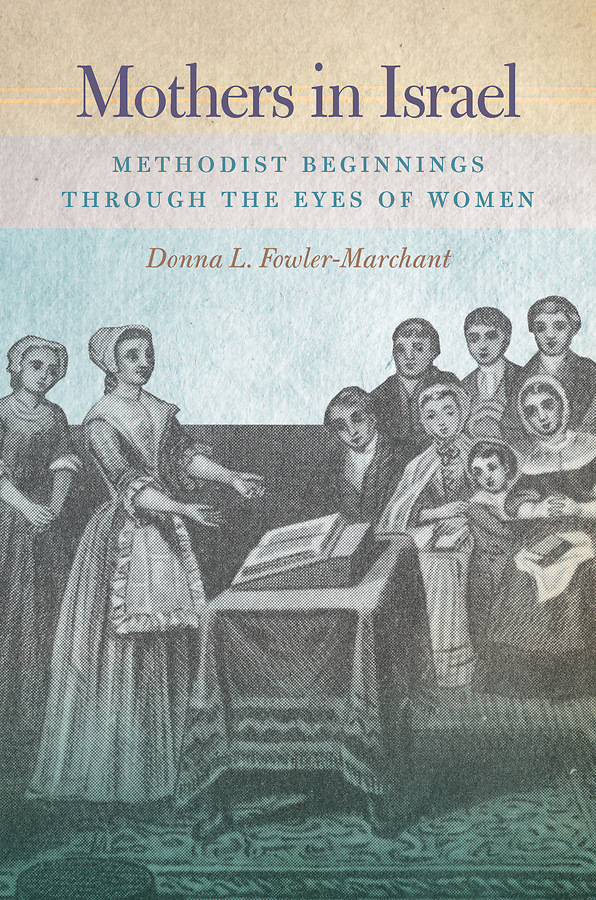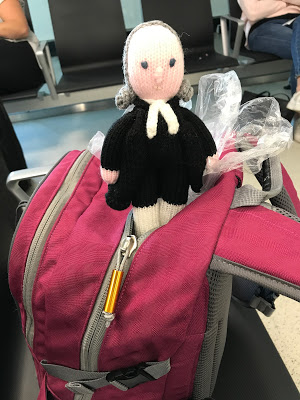Join us in welcoming Rev. Dr. Donna Fowler-Marchant as our guest blogger this week. She is a Christ-follower in the Wesleyan tradition and an elder in the United Methodist Church. She is passionate about Wesleyan theology and how it relates to life today. Her blog Travels with Wesley is a way of making Wesleyan heritage accessible to modern Christians. She is currently serving within the British Methodist Church at a circuit in Hertfordshire. Her new book is Mothers in Israel: Methodist Beginnings Through the Eyes of Women.
Why Mothers?

One of the first questions people ask about my book is, “Why is the title, ‘Mothers in Israel?’ Aren’t you talking about Methodist women?” Well, yes, I am. John Wesley called Methodist women “sisters” and the men “brothers.” A few exceptionally courageous and faithful women leaders earned the title “Mothers in Israel,” hearkening back to Deborah the judge in the Old Testament.
I have been curious about untold “her-stories” of history since my undergraduate days at Meredith College. That interest continued when I was a student at Duke Divinity School and later, at Wesley Theological Seminary. My doctoral project entitled “Fire in Our Bones: Clergywomen Faithful to the Divine Call” highlighted women’s experiences. Years later on a Wesley pilgrimage to England, I felt that passion kindle anew. Being in the Old Rectory – where Susanna Wesley educated her children, kept a spiritual journal, and composed theological essays and controversially led worship with her neighbors – I saw her take on a new shape in my mind as someone who profoundly shaped the theology and practice of the nascent movement that became Methodism.
+++++++
While on sabbatical the following year, I spent time in the Methodist Archives at the John Rylands Library in Manchester, England. Initially I wanted to explore how John Wesley was a spiritual director to women through his letters. However, I soon discovered the ways in which the women mentored each other. And my focus shifted when I saw that women even offered spiritual advice to Wesley himself.
Seeing the actual letters Susanna Wesley wrote to her husband Samuel to justify her unconventional kitchen prayer meetings opened my eyes. She was a dutiful woman of her time. And she also dared to buck societal expectations. She did so when she felt the Spirit calling her.
I began to wonder what effect those meetings, led by a strong, intelligent woman of faith, had on young “Jackie” Wesley. Were there traits shared by her and the women who later filled leadership roles within early Methodism? Was there a common thread that tied them together? I found that they all possessed a sense of being more obedient to God than to ANY human authority, even the Church, even a husband, even a parent.
I found that they all possessed a sense of being more obedient to God than to ANY human authority, even the Church, even a husband, even a parent.
So, I began to write more about women in my blog. After conversations with someone at the General Board of Higher Education and Ministry (UMC), the book finally began to take shape. I soon discovered that writing a book requires focus and organization. And although self-discipline is key, accountability by someone else is also a great help.
Telling Their Stories
Although parents raised girls to be meek and submissive, these early Methodist women shared a passion for service to God and neighbor. That passion fueled and sustained their ministries as visitors to the sick, housekeepers, class leaders, exhorters, and for some, as preachers. Women’s leadership in public ministry is as old as Methodism itself; it is part of our spiritual DNA. Yet, how few people, clergy and laity alike are aware of the importance and influence of women like Sarah Crosby, Sarah Ryan, Mary Bosanquet Fletcher, and Mary Tooth!
Therefore, I wrote with that in mind. I wondered, “What if we regularly told their stories and learned from them? What if we saw them not as footnotes but as an integral part of the story itself? What if we learned FROM them and not just ABOUT them?” If we did, I believe fewer clergywomen would find themselves at an appointment where their experience, their call, and their faith count for little in the eyes of those who don’t want a woman as their pastor.
One thing is clear. If we celebrated the ways in which they left their mark on early Methodism and honored them for their holy boldness and faithfulness, we would have a richer understanding of who we are and who we can be. I believe Mothers in Israel: Methodist Beginnings Through the Eyes of Women will help us to do exactly that.
+++++++
 If you follow me on social media, you will soon notice that an adorable knitted figure of John Wesley is frequently featured. He is the unexpected and beloved gift of a friend who made just two such dolls. With his precise grey curls, proper preaching bands, and piercing blue eyes, he makes – and leaves – quite an impression, and I am so pleased to have him as my traveling companion through the fascinating and wonderful history of the people, especially the women, called Methodists.
If you follow me on social media, you will soon notice that an adorable knitted figure of John Wesley is frequently featured. He is the unexpected and beloved gift of a friend who made just two such dolls. With his precise grey curls, proper preaching bands, and piercing blue eyes, he makes – and leaves – quite an impression, and I am so pleased to have him as my traveling companion through the fascinating and wonderful history of the people, especially the women, called Methodists.
+++++++
Find more from Rev. Dr. Donna Fowler-Marchant here:
See her Travels with Wesley blog and Facebook page.
Watch an interview with her at “Writing for Your Life.”




